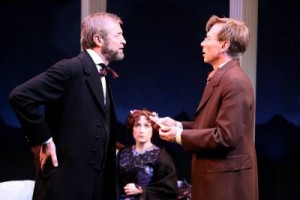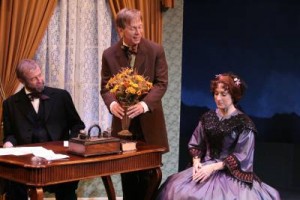
An elderly man enters from the back of the theater, climbs slowly onto the stage, and apologizes for his late arrival. Pointing to a star-spangled banner framed upstage center, he declares, “A beautiful flag, is it not?,” adding, “Forty-five stars.” (Program notes give the year as 1909.) This elderly man, John Hay, informs us that he is going to tell us a story … about “a man, a lady, and a man whose secretary I was. The lady will be new to you, but the man will be as familiar to you as the penny in your pocket.”
The man on the penny is of course Abraham Lincoln, and in Better Angels, Wayne Peter Liebman’s lovely new historical drama, now in its West Coast Premiere at the Colony Theatre in Burbank, we are given (in Hay’s words), “a chance to know the real man.”
Better Angels tells of a little-known week in Lincoln’s life, the week he was visited by a certain Mrs. Cordelia Harvey, widow of the Governor of Wisconsin. Like our own century’s Cindy Sheehan, Mrs. Harvey has come to the President on a mission. Unlike Sheehan’s experience with President George W. Bush, Mrs. Harvey is granted a meeting with President Lincoln, and the United States is a better place because of it.
At first, however, Lincoln is resistant to meeting someone he believes has come with yet another request for a pardon. No, corrects Hay, Mrs. Harvey is here because she wants to build a hospital. His interest piqued, the President decides to give the lady a few minutes of his time.
Mrs. Harvey tells the President that she wishes to build a hospital in her home state of Wisconsin, a hospital where wounded Union soldiers could be sent to recuperate in the clean, healthy air of the North rather than seeing their wounds fester in the fetid air of hospitals closer to the battle zone. She quickly dismisses the prevailing “wisdom” that if hospitals were to be built in the North, soldiers would decide to desert once their wounds had healed. Nonsense, declares Mrs. Harvey, adding that Northern hospitals would mean ten times the current recovery rate. Ten surviving soldiers for every one who survives now.
Lincoln informs Mrs. Harvey that the man she should be seeing is the Secretary Of War, and he gives her a letter of introduction. Still, when she asks for permission to return to the White House, the President grants it. Mrs. Harvey will pay a number of return visits to Lincoln’s office over the week that follows and be among the very first to read the Gettysburg Address.
Better Angels brings American history to vivid life, providing a behind-closed-doors glimpse at a President whose penny profile is (in playwright Liebman’s words) “as remote and lifeless as the copper it was stamped on.” The Abraham Lincoln Liebman introduces us to is a jovial, folksy man with “a sweet tooth for low humor,” but he is much more than that. Though Lincoln sees saving the Union as even more important than freeing the slaves, his Emancipation Proclamation provokes the very same kind of vicious editorials and hate mail that we now read about President Obama on a daily basis. Ultimately, the Lincoln of Better Angels is a man who, in Hay’s words, “could bore under a thing right to the bedrock,” something proven true by Lincoln’s moving declaration that “if slavery is not wrong, nothing is wrong.” It’s powerful stuff to be witness to so much greatness.
It’s Lincoln ’s human side that leaves the strongest impression, though, that of a man who can make Mrs. Harvey remark upon meeting him for the first time, “I had not come prepared to laugh today.” Liebman shows us the playful Lincoln, one who enjoys dancing and cavorting with his secretary, but we also see a man suffering from an insomnia that he knows even sleep won’t cure, because “the tired part of me is inside and out of reach.” When Lincoln the President learns of 10,000 dead in a battle gone terribly wrong, Lincoln the man breaks down in sobs. Rarely has a political leader’s greatness and his humanity been more exquisitely depicted on stage.
Dan Bonnell makes an impressive Colony Theatre directorial debut here, as do his stellar actors: James Read as Lincoln, McKerrin Kelly as Mrs. Harvey, and David Dean Bottrell as John Hay.
It takes a few minutes to accustom oneself to the handsome Read as the not terribly good-looking Lincoln we’ve seen on the penny and five-dollar bill, but we soon accept that this is the man whose face we know probably better than any other’s in our history books. Read’s is a performance of great warmth, depth, wisdom, and humanity, and the same can be said for Kelly’s as Mrs. Harvey. With the loveliness of a Franklin Mint doll and the grace of a true lady, Kelly has us at “Hello, Mr. Lincoln.” It’s not at all hard to imagine an attraction between the two turning to love in a different time and place, making the “first meeting” that an elderly Hay imagines all the more touching. As Hay, Bottrell gets possibly the best role of all, and he plays it superbly. Transitioning effortlessly and seamlessly from the slow-moving, stooped septuagenarian we first meet to the energetic 25-year-old who served by Lincoln’s side, Bottrell shows us a man of piquant charm and delightful wit. (When Lincoln declares, “I don’t understand women,” Hay quips, “No man who understood women would have married that harpie!” The “harpie” in question is of course Lincoln’s wife, Mary Todd Lincoln, apparently not the nicest of ladies.)
As always, the Colony has assembled a top-notch design team. There’s Victoria Profitt’s beautiful modular set, which suggests Lincoln’s elegant White House office without requiring extensive detail. As for lighting, this is only the second or third production I’ve seen lit by Chris Wojcieszyn, and though I have no idea how to pronounce his name, it’s one I hope to see more of. His lighting design here is exquisite. Cricket S. Myers, the undisputed First Lady of L.A. sound design, has created yet another memorable mélange of sound and music, fiddles and gunfire, and who better than A. Jeffrey Schoenberg to costume the three characters in period garb?
One can only wonder what Mrs. Harvey would make of today’s America . I hope to remember her statement that “resistance to an idea does not prove the idea wrong” whenever someone cites public opinion polls as a reason to say, oppose marriage equality or support the death penalty. I feel fortunate indeed to have met and spent time with this incredible woman, as well as with the man considered by many to be American’s greatest President, and with the young man who brought the two together. If only we could all seek to find the “better angels” of our nature, following the examples set by these three great Americans.
Colony Theatre, 555 North Third Street , Burbank .
www.colonytheatre.org
–Steven Stanley
October 24, 2009
Photos: Michael Lamont




 Since 2007, Steven Stanley's StageSceneLA.com has spotlighted the best in Southern California theater via reviews, interviews, and its annual StageSceneLA Scenies.
Since 2007, Steven Stanley's StageSceneLA.com has spotlighted the best in Southern California theater via reviews, interviews, and its annual StageSceneLA Scenies.







 COPYRIGHT 2024 STEVEN STANLEY :: DESIGN BY
COPYRIGHT 2024 STEVEN STANLEY :: DESIGN BY